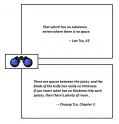The Ideal and the Practical — the Practice
[ by Charles Cameron — cross-posted from BrownPundits in response to a friend’s comment there ]
.
I’d written a response to @AnAn and included a quote from the Chuang Tzu’s chapter on Lord Wen-hui and what he learned from his Cook Ting, and wanted to throw in the following DoubleQuote — but graphics seem to be discouraged in the Comment sections here, so I’ve opened this post for the purpose:

The thing is, Lao Tzu offers us the ideal statement, formulated in terms of an impenetrable absence of space, and an absence of substance to the point of non-existence — while Chuang Tzu, peering over Lord Wen-hui’s shoulder right there in Cook Ting’s kitchen, offers us the same insight, couched in terms of there being “spaces between the joints” and his knife having “really no thickness” — Chuang Tzu’s measureless insight penetrates Lao Tzu’s impenetrable absolutes to show us there’s room for play there — “room — more than enough for the blade to play about in”.
If we bear these two versions of the same idea — formulated ideally and in practical terms by the two principle philosopher-poets of the Taoist school — in mind when our thoughts run up against the impracticality of an ideal, we may find, like Cook Ting, that we too have room enough room to play in.
Bryan:
June 20th, 2019 at 7:59 pm
Couldn’t quite see what this was in response to but very excited to see Chuang Tzu mentioned, as the Inner Chapters is one of my all time favourite books (as is the Tao Te Ching). I read it so many times in my younger years that it has a strange resonance now, like every word is familiar even though I certainly couldn’t quote it off the top of my head.
This idea of substance and space is fascinating. I’ve been thinking more about the inability for matter to touch at all, just to have electrons repulsing each other or something like that.